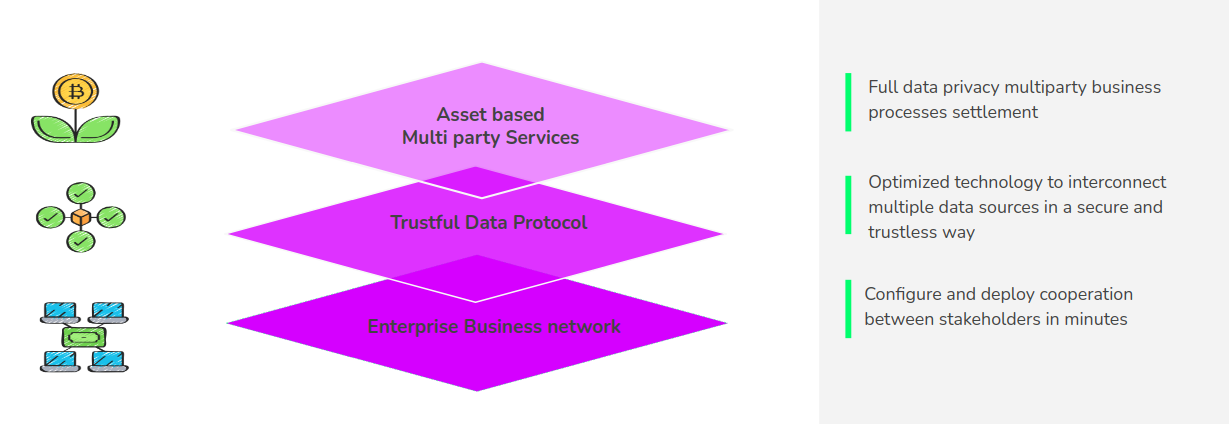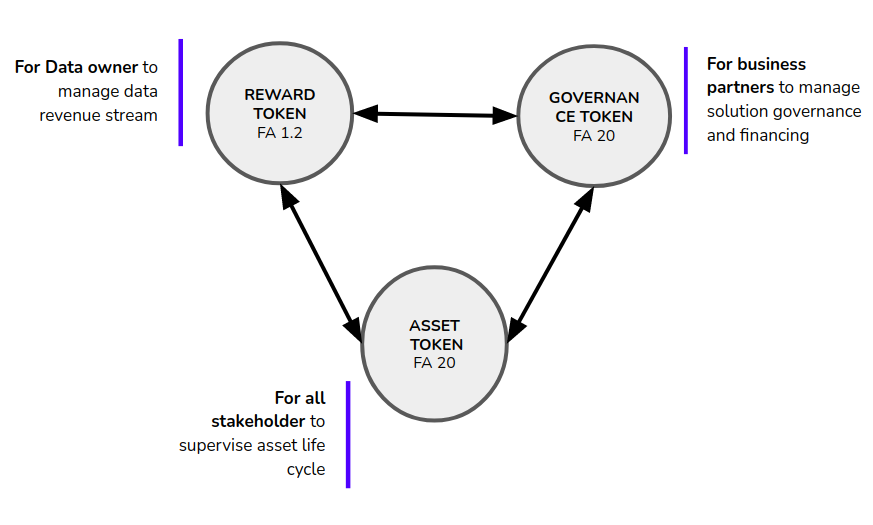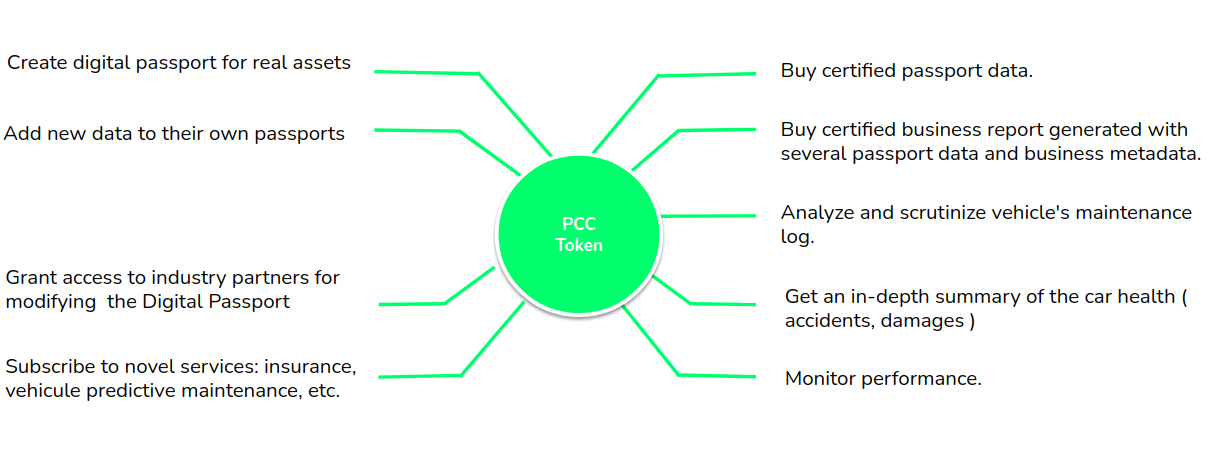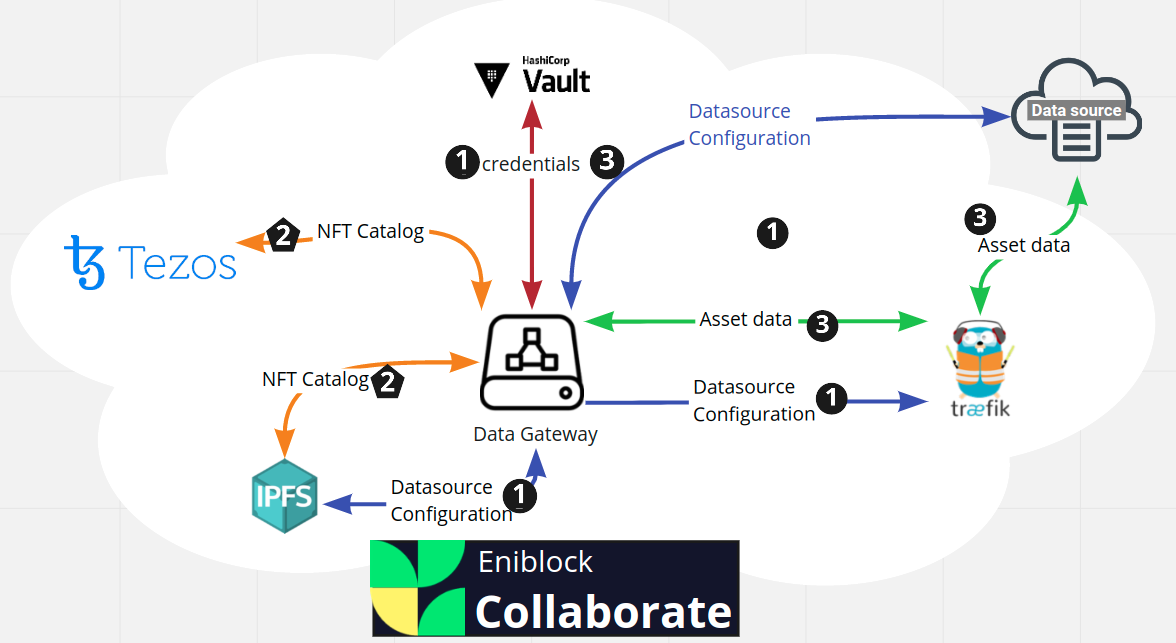The main goal of Passport for Connected Car (PCC) is to bring more health to existing markets - for example by ensuring the reliability of the residual value of the car on the second-hand market - but it also opens up new opportunities by building the grounds for a large, secure, and fair market data platform. Information that was previously collected individually in silos by each market participant, can now be shared in a collaborative approach, allowing to build new services such as pay-as-you-go insurance solutions, or predictive maintenance offers. The blockchain technology ensures the security and sovereignty of the collected data, and allows an efficient and fair re-distribution of the value created using tokens and will drive following benefits for the whole ecosystem :
- Ensure end to end car data certification and traceability during whole car life cycle.
- Ease car technical data exchange between all the stakeholder.
- Enable new services opportunities such as predictive maintenance or pay how you drive insurance by leveraging certified data.
Streamline end user car passport application development enabling car data (administrative, technical, regulatory) follow up and management.
The ambition of this product is to foster collaboration within the digital asset ecosystem by providing a backbone for all asset stakeholders implementing asset single source of truth, GDPR compliant data sharing and built-in data monetization capabilities in order to improve asset supply chain process and life cycle services by unleashing trustful data sharing.
Our solution can be understood in three layers: an Enterprise Business Network, A Trustful Data Protocol, and the Applications and Multi party Services Marketplace. Each component plays a distinct role allowing members to derive the most value for their businesses.
The foundation of the solution is its business network: from asset design to asset user or operator. Each party shares information that can be tracked, stored and actioned across the platform throughout an digital passport.
Our solution Protocol is accessible via an open Application Programming Interface (API) and brings together the business network through a set of open standards. Powered by blockchain technology, the platform enables the industry to share information and collaborate securely.
An open Applications and Multiparty Services Marketplace allows both consortium and third parties to publish fit-for-purpose services atop the Protocol, fostering innovation and value creation.
The car data network and protocols are brought to life by many interacting software components, organized in five layers: Application, Service, Access, Infrastructure, and Blockchain.
The application layer is composed of the Passport APP and the Governance APP.
This application allows end-users to the consultation and the update of the passport conveyed by the end-users.
Services accessible to end-user through this application are:
- Manage access right (grant/remove) to vehicle passport data.
- Find out the car’s authentic metric (i.e. odometer readings) at different times.
- Get an in-depth summary of the car health (accidents, damages)
This application is dedicated to the consortium members. It offers an interface and functionalities for monitoring and managing platform data (e.g. datasources and data storage management, access control, and monitoring of revenue related to data valuation).
Several APIs will be provided :
-
Asset-Vehicle life cycle API1 : Allows the creation, consultation and the update of the digital passport conveyed by digital passport owner or by any other asset stakeholder data provider (e.g. invoice to be added to a repair visit).
-
Security API1 : This service, used by the platform users, offers mechanisms to manage identities and access control. Services accessible to end-user through this application are:
- Identity Federation or Broker: An intermediary service that connects multiple service providers with different identity providers. As an intermediary service, the identity broker is responsible for creating a trust relationship with an external identity provider in order to use its identities to access internal services exposed by service providers.
-
Partners API1 :provides an HTTP API to consortium members only, for interacting with data coming from the digital passport (on-chain) or directly from the system of another Partner system (off-chain). This process will be secured by token authorization mechanism.
-
Analytics API1: Store (off-chain) and manage business KPI and analytic about the data assets available in the marketplace, like the digital passport.
-
Data Marketplace API2: provides an HTTP API to all network participants, for interacting with data coming from the digital passport (on-chain) or directly from the system of another Partner system (off-chain). This process will be secured by an end-to-end encryption environment. Services accessible to end-user through this application are:
- Manage access right (grant/remove) to partner data.
- Access anonymous data to analyze business performance. (i.e. number of accidents per vehicle brand, number of accidents by age rates).
- Generated verified reports with their own data or supplement those reports with to PCC data to sell it in to other partners by using the marketplace.
-
Governance API2: allow the management of the Data platform and access control, accessible for the administrator profiles.
-
Notification API2 : API that manages the interaction between the platform data and external consortium systems for full enterprise integration. The most basic scenario is to notify data owners on the activity of their data in real-time.
This layer provides access mechanisms to the infrastructure layer for APIs of the service layer.
It provides mechanisms to access the datasources of all the consortium members and the Data Storage of the same consortium member. In order to achieve interoperability and adaptability goals, several connectors for the most common datasources ( Web Services, Relational Database, Files systems) are provided. In order to guarantee the security and the privacy of the system, any data is duplicated, notarization services based on fingerprint mechanism are used.
It provides mechanisms to access the Key Storage and to sign blockchain transactions.
It provides mechanisms for controlling access to datasources resources.
It provides APIs to interact with the most common public blockchain: Tezos and Etherieum. It includes services like
- Rest API for calling Smart contracts entry points
- Generic API for Transaction forge
- Generic API for Transaction submission using a pool of blockchain RPC gateways
- Generic API for Transaction Confirmation using a pool of indexer.
All infrastructure components related to PCC platform are represented in this layer:
- Data cache and load management: Data from the Access layer is persisted into a local cache (Rabbit MQ, Local DB) for short durability and deleted after no more than X days. Business privacy contents are assured by Data encryption and Data partition by client channels.
- Decentralized File System: Some data will only store a fingerprint of its content in the smart-contrat and a link to get the data via a decentralized File System. So smart-contract storage size and cost can be reduced and each consumer would be able to ensure that data has not been maliciously altered.
- Key storage : Secure, store and tightly control access to tokens, passwords, certificates, encryption keys for protecting secrets and other sensitive data using an HTTP API.
Four Main Smart contract for asset management are defined :
-
Asset Digital Passport : define the set of data (or data model) as a Non Fungible token, implemented following the tezos FA 2.0) which can be,
- A simple and generic structure with a digital fingerprint of the asset data and metadata stored in a third party system. (blockchain-based timestamping)
- A simple table of attributes of an asset. In the case of a car : Vin, Model, Color then will be stored in a common golden data (blockchain ledger) and a digital fingerprint of the asset metadata stored in a third party system (blockchain-based timestamping).
- A more complex structure that represents the whole Life cycle of an Asset based on Event, Metric, etc. In the case of a car, Maintenance Event with Kilometer and Pieces state metrics.
-
Asset Access Management smart contract : Asset Digital Passport is highly coupled with the Asset Access Management smart contract, composed of set of rules for ensuring compliance with GDPR regulation for vehicle passports data, like :
- Role-based access management : Define Participants (parties) and their role over the Asset.
- Consent Management : responsible for managing data owner personal data disposal policies and the corresponding consents, including generation, updates and duplication.
- Data access registry : keep a full registry of data owner consent for data access and usage.
-
Asset Monetization - PCC Token : smart contract for Asset data monetization defined as an tezos FA 1.2 Utility token. These tokens will be associated, with Asset Digital Passport, for passport data exchange.
-
Governance - Golden Token : smart contract enabling consortium members to manage the governance of the solution in proportion to their respective contributions.
For details about how Token will be used in the PCC platform, refer to section Use of tokens
In the context of the PCC solution, three distinct tokens are defined. This distinction ensures the tokenization of the vehicle as an asset token, the management of the economic flows related to the PCC solution's services thanks to a reward token, and the governance of the solution between the industrial members on the other using a governance token.
The Asset Token is a digital token used to represent verifiable proofs of authenticity and ownership of a real asset. In the case of complex real assets such as real estate or car, the asset token is a non-fungible token composed of a set of data collected and handled by various stakeholders (issuer, designer, suppliers) as depicted in table 1.
The concept of asset digital passport aim at gathering all verifiable and certified data describing asset and associated management rules into one blockchain-based structure composed of:
- A Non-fungible token, following the standard FA1.2, representing the real asset and updated at each step of its lifecycle and composed by data collected, stored at each stakeholder data warehouse.
- An Asset Access Smart Contract defining conditions and rules for each asset stakeholder to certify access, authorization to use, or manage digital passport data. Taking into account, any usage of vehicle data must be compliant with GDPR regulations, the core part of this contract is the management of owner consent and complete access traceability.
The PCC_Token is designed to allow both individual users and industrial members to:
- Value the creation and contribution to the Vehicle Passport application.
- Offer discounts or rewards for subscribing to services in exchange for sharing vehicle data.
- Ensure the distribution of the value of a service between the different contributors within the PCC platform.
The PCC_Token will be at the heart of new economic exchanges between vehicle owners or drivers and the industrial stakeholders. All these new transactions will be based on the use of the vehicle's passport app and access to new personalized services. Figure 12 (below) illustrates some scenarios for using the PCC solution based on PCC_Token transactions.
The PCC_Gold aims to enable consortium members t manage the governance of the solution in proportion to their respective contributions by :
- Business network management: define Participants ( parties) and their role on the blockchain.
- Token management: Manage all operational and usage aspects of the PCC_Token, Asset token, and Gold token itself.
The PCC _Gold is used in all operations involving a collaborative decision. The decision-making process requires the vote of each consortium member. To ensure a fair and equitable representation of each consortium member, each voter's weight is proportional to the amount of PCC _Gold at his disposal.
The Collaborate Open API is updated after each merge on the develop branch of the project repository.
Detailed usage about:
- IAM: Identity Access Management
- (1) Configuring datasources
- (2) Creating NFT Token for assets
- (3) Consuming NFT Token associated data
see also:






